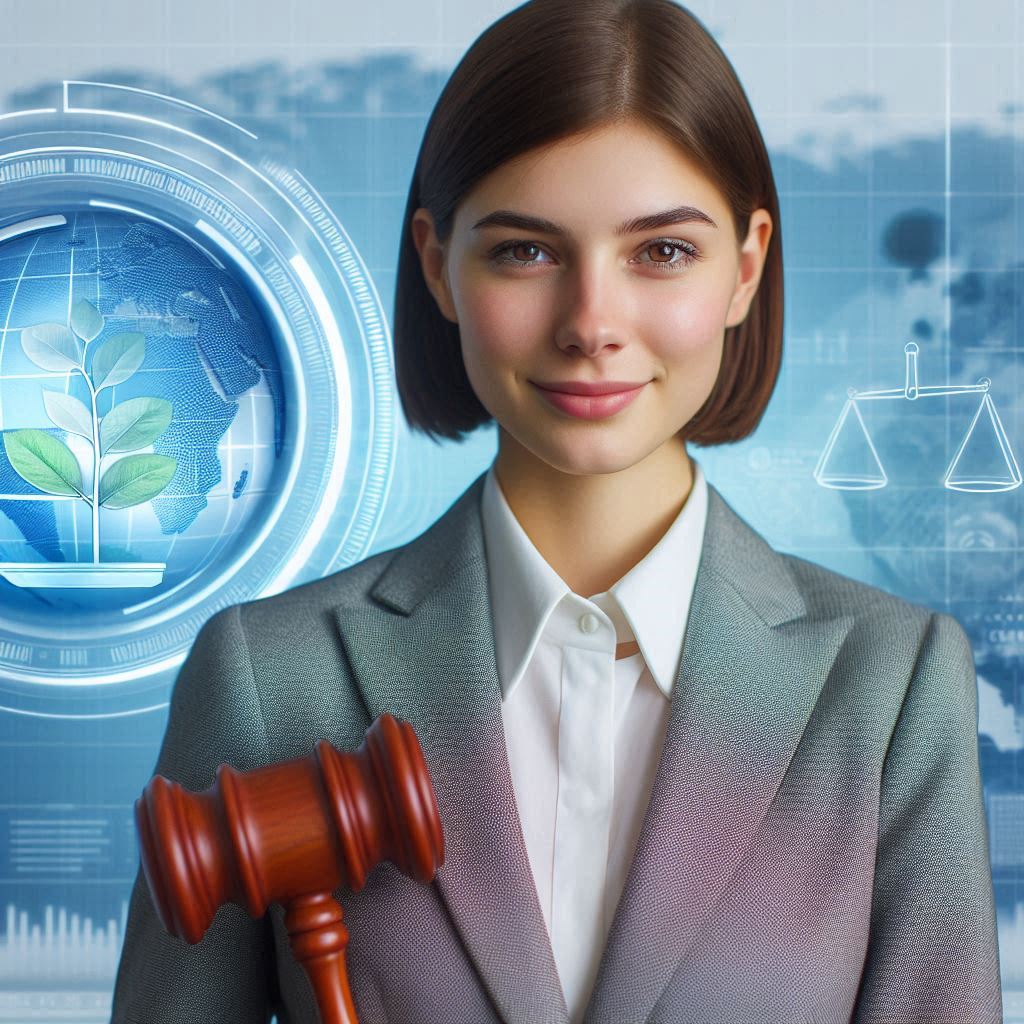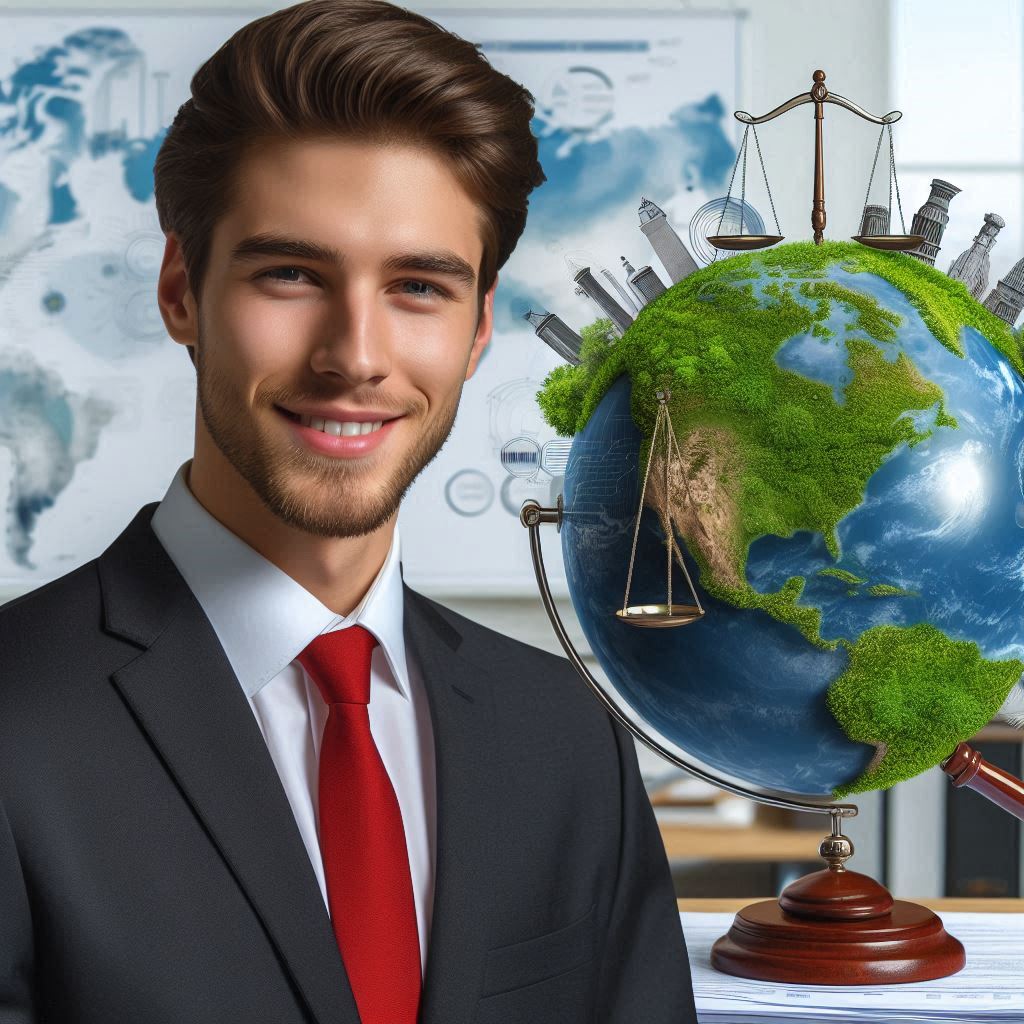Introduction
Environmental lawyers are pivotal in advancing sustainable development, ensuring that economic growth aligns with ecological preservation.
These legal professionals specialize in environmental law, advocating for policies and practices that protect natural resources, promote public health, and ensure a balanced relationship between human activities and the environment.
Environmental lawyers play a crucial role in advocating for environmental protection and justice.
They work with governments, non-governmental organizations (NGOs), and private entities to develop and enforce regulations that mitigate environmental harm.
By holding corporations and individuals accountable for pollution and resource depletion, they help prevent practices that could lead to long-term ecological damage.
Their advocacy often involves litigation to uphold environmental laws and ensure compliance, which is essential for sustainable development.
One of the key responsibilities of environmental lawyers is to draft and implement legislation that promotes sustainability.
This includes creating laws that regulate emissions, protect endangered species, and promote the use of renewable energy sources.
By pushing for stronger environmental regulations, they help reduce the carbon footprint and promote cleaner, more sustainable practices.
Environmental lawyers also play a vital role in representing communities affected by environmental injustices.
Many marginalized communities bear the brunt of environmental degradation, facing health risks from pollution and limited access to clean water and air.
Role of Environmental Lawyers in Policy Advocacy
Environmental lawyers play a crucial role in advocating for policy changes that promote sustainable development and protect the environment.
Through their expertise in environmental law, they work tirelessly to influence policy development at various levels – local, national, and international.
Local Level Advocacy
Environmental lawyers engage with local governments to strengthen environmental regulations and ensure compliance with existing laws.
They often work closely with community groups and environmental organizations to address specific environmental issues affecting a particular region.
Their efforts can lead to the implementation of new policies or the enforcement of existing laws to prevent environmental harm.
National Level Influence
At the national level, environmental lawyers play a key role in shaping environmental policies through legislative advocacy and litigation.
They work with policymakers, lawmakers, and government agencies to propose and draft new legislation that promotes sustainable development and protects natural resources.
Through strategic litigation, they challenge government actions that threaten the environment and advocate for stronger environmental protections.
International Advocacy
Environmental lawyers also contribute to global efforts to address environmental challenges through advocacy at the international level.
Transform Your Career Today
Unlock a personalized career strategy that drives real results. Get tailored advice and a roadmap designed just for you.
Start NowThey participate in international negotiations, conventions, and treaties to promote sustainable development practices and ensure the protection of the environment on a global scale.
By engaging with international organizations and collaborating with other countries, environmental lawyers help shape international environmental policies and agreements.
Successful Policy Changes
There have been several notable examples of successful policy changes facilitated by environmental lawyers.
One such example is the adoption of the Paris Agreement in 2016, which was a landmark international treaty aimed at reducing greenhouse gas emissions and combating climate change.
Environmental lawyers played a significant role in negotiating and drafting the agreement, as well as advocating for its ratification by countries around the world.
In addition to the Paris Agreement, environmental lawyers have been instrumental in advancing policies related to renewable energy, biodiversity conservation, waste management, and pollution control.
Their advocacy efforts have led to the establishment of national parks, marine protected areas, and wildlife sanctuaries to protect endangered species and ecosystems.
They have also influenced the development of regulations governing air and water quality, hazardous waste disposal, and sustainable land use practices.
Overall, environmental lawyers play a vital role in advocating for policy changes that promote sustainable development and protect the environment.
Through their expertise, dedication, and strategic advocacy efforts, they help shape environmental policies at all levels – from local communities to the global stage.
Their work is essential in ensuring a sustainable future for our planet and its inhabitants.
Read: Environmental Law vs. Other Legal Specialties
Environmental Impact Assessments
The role of environmental lawyers in conducting and evaluating environmental impact assessments for projects
Environmental lawyers play a crucial role in ensuring that development projects align with sustainability principles through comprehensive environmental impact assessments (EIAs).
These assessments are essential for evaluating the potential environmental effects of proposed projects, from infrastructure developments to industrial operations.
The primary function of environmental lawyers in this context involves guiding the assessment process and ensuring compliance with environmental regulations.
When a project is proposed, environmental lawyers help in the preparation and review of EIAs, ensuring that all potential environmental impacts are thoroughly analyzed.
This includes examining how the project might affect air and water quality, wildlife habitats, and local communities.
By scrutinizing these assessments, lawyers ensure that they provide a clear and accurate picture of the project’s environmental footprint.
How environmental lawyers ensure that development projects adhere to environmental regulations and sustainability principles
Additionally, environmental lawyers play a pivotal role in advocating for transparency and public participatio.
Showcase Your Business Today
Reach thousands of readers actively exploring professional services. Publish your business profile and grow your audience now.
Publish NowThey ensure that stakeholders, including local communities and environmental groups, have the opportunity to review and comment on EIAs.
This participatory approach not only enhances the accuracy of the assessments but also fosters community trust and support for sustainable development.
Furthermore, environmental lawyers ensure that development projects comply with existing environmental laws and regulations.
They scrutinize project proposals to ensure they meet legal requirements and sustainability standards.
By doing so, they help prevent potential legal conflicts and environmental harm that might arise from non-compliance.
Their expertise also aids in negotiating mitigation measures or adjustments to project plans to minimize adverse environmental impacts.
In summary, environmental lawyers are vital in promoting sustainable development through their involvement in environmental impact assessments.
They ensure that development projects adhere to legal standards and sustainability principles, contributing to the protection of natural resources and the well-being of communities.
Read: How to Specialize in Environmental Litigation

Litigation and Legal Action
The role of environmental lawyers in representing communities and organizations in legal proceedings against environmental violations
Environmental lawyers play a crucial role in advancing sustainable development by representing communities and organizations in legal battles against environmental violations.
Their work is vital in ensuring that laws designed to protect the environment are enforced and that those responsible for environmental harm are held accountable.
Examples of landmark cases where environmental lawyers have successfully advocated for environmental justice
A prime example of their impact can be seen in the landmark case of Massachusetts v. Environmental Protection Agency (2007).
In this case, the Supreme Court ruled in favor of Massachusetts, holding that the EPA had a duty to regulate greenhouse gas emissions under the Clean Air Act.
Environmental lawyers argued that the EPA’s inaction on climate change was unlawful, demonstrating how legal advocacy can drive significant environmental policy changes.
Another notable case is Chevron v. Ecuador (2011), where environmental lawyers successfully represented Ecuadorian communities against Chevron.
The case, which involved pollution from oil drilling in the Amazon rainforest, resulted in a $9.5 billion judgment against the company for its environmental damage.
This case highlights the power of legal action in holding corporations accountable for environmental degradation and securing justice for affected communities.
These cases underscore the essential role of environmental lawyers in promoting sustainable development.
Through litigation, they not only address immediate environmental issues but also set precedents that influence future environmental policy and corporate practices.
Their advocacy ensures that environmental laws are not just written but actively enforced, contributing to a more sustainable and just world.
Read: Famous Civil Rights Advocates in History
Collaboration with Stakeholders
Environmental lawyers play a crucial role in collaborating with various stakeholders to promote sustainable development.
By working together with government agencies, non-profit organizations, and industry stakeholders, they can effectively address environmental issues and work towards a more sustainable future.
Collaboration with Government Agencies
Environmental lawyers often collaborate with government agencies at the local, state, and federal levels to advocate for environmental protection and sustainable development.
They work closely with these agencies to ensure that environmental laws and regulations are enforced and implemented effectively.
By partnering with government agencies, environmental lawyers can help shape policies and initiatives that promote sustainable practices and protect the environment.
Collaboration with Non-Profit Organizations
Non-profit organizations play a vital role in advocating for environmental issues and promoting sustainable development.
Environmental lawyers often work with these organizations to support their initiatives, provide legal expertise, and help drive change through advocacy and litigation.
By collaborating with non-profit organizations, environmental lawyers can amplify their impact and work towards common goals to protect the environment.
Collaboration with Industry Stakeholders
Industry stakeholders, including businesses and corporations, have a significant impact on the environment and play a crucial role in promoting sustainable development.
Environmental lawyers work with these stakeholders to help them comply with environmental regulations, adopt sustainable practices, and reduce their environmental footprint.
By collaborating with industry stakeholders, environmental lawyers can drive change within organizations and industries to promote sustainability and protect the environment.
Importance of Building Partnerships and Coalitions
Building partnerships and coalitions with various stakeholders is essential for advancing environmental initiatives and promoting sustainable development.
By working together, stakeholders can leverage their expertise, resources, and influence to address complex environmental challenges effectively.
Collaborating with government agencies, non-profit organizations, and industry stakeholders allows environmental lawyers to build strong networks, share knowledge and best practices, and collectively work towards achieving common objectives.
In essence, collaboration with stakeholders is key to promoting sustainable development and advancing environmental initiatives.
Environmental lawyers play a crucial role in fostering partnerships and coalitions with government agencies, non-profit organizations, and industry stakeholders to address environmental issues and drive positive change towards a more sustainable future.
Read: Top Environmental Law Schools in the United States
Compliance and Enforcement
Environmental lawyers play a crucial role in advancing sustainable development by ensuring businesses and organizations adhere to environmental laws and regulations.
Their work involves a multifaceted approach to compliance and enforcement, aimed at protecting ecosystems and promoting responsible resource use.
Showcase Your Business Today
Reach thousands of readers actively exploring professional services. Publish your business profile and grow your audience now.
Publish NowEnsuring Compliance
Environmental lawyers work closely with regulatory agencies to ensure that businesses comply with a myriad of environmental regulations.
This involves advising companies on legal requirements, conducting audits to assess compliance, and helping to implement practices that minimize environmental impact.
By providing legal guidance, they assist organizations in navigating complex environmental laws, including those related to waste management, pollution control, and land use.
Additionally, environmental lawyers may draft and review contracts to ensure they include necessary environmental provisions, thereby embedding sustainable practices into business operations.
Challenges in Enforcement
Despite their efforts, enforcing environmental standards poses significant challenges.
One major issue is the complexity of environmental laws, which can vary widely across jurisdictions and be subject to frequent changes.
This legal complexity can make it difficult to hold violators accountable and ensure consistent enforcement.
Another challenge is the resource disparity between large corporations and regulatory agencies.
Large businesses often have substantial legal and financial resources to challenge enforcement actions, leading to prolonged legal battles that can strain regulatory agencies’ budgets and delay justice.
Moreover, environmental lawyers face difficulties in addressing violations by organizations that operate in multiple regions with differing environmental standards.
This can complicate enforcement and require a coordinated effort across various jurisdictions.
Environmental lawyers are vital to promoting sustainable development by ensuring compliance with environmental laws and enforcing standards.
Despite facing challenges such as legal complexity and resource imbalances, their role remains essential in advancing environmental protection and fostering a sustainable future.
Education and Outreach
The role of environmental lawyers in educating the public about environmental issues and promoting sustainable practices
Environmental lawyers play a crucial role in sustainable development through their efforts in education and outreach.
By educating the public about environmental issues, these professionals bridge the gap between complex legal concepts and community understanding.
Their work often involves conducting workshops, seminars, and informational campaigns that demystify topics like climate change, pollution, and conservation strategies.
This educational outreach helps individuals and communities make informed decisions about their environmental impact and encourages the adoption of sustainable practices.
The importance of raising awareness and building community support for environmental conservation efforts
Raising awareness is essential for building community support for environmental conservation.
Environmental lawyers collaborate with schools, local governments, and non-profit organizations to disseminate information about environmental regulations, the benefits of sustainable practices, and the importance of protecting natural resources.
By engaging with diverse audiences, they foster a culture of environmental responsibility and inspire collective action.
Moreover, these legal professionals often advocate for policy changes that promote sustainability.
Through public speaking, writing, and advocacy, they emphasize the need for stronger environmental protections and more sustainable development practices.
They shape public opinion and influence policymakers.
Their efforts ensure environmental concerns are addressed in legislative and regulatory frameworks.
In summary, environmental lawyers are pivotal in advancing sustainable development by educating the public and raising awareness.
Their outreach efforts not only inform but also empower communities to engage in conservation efforts actively.
By building a well-informed and supportive community, these professionals drive the movement towards a more sustainable future.
They help promote environmental consciousness through active engagement and collaboration.
Conclusion
Environmental lawyers play a crucial role in ensuring sustainable development by advocating for environmental protection and conservation.
They work tirelessly to address legal issues related to pollution, deforestation, climate change, and other environmental challenges.
By enforcing environmental laws and regulations, they hold industries and governments accountable for their actions that harm the environment.
Environmental lawyers also play a vital role in drafting and negotiating agreements that promote sustainable development initiatives.
They provide legal expertise to ensure that these agreements are in compliance with national and international environmental laws.
Through their advocacy and legal actions, environmental lawyers help safeguard our planet’s resources for future generations.
In the end, environmental lawyers are instrumental in promoting sustainable development through their advocacy work.
It is crucial to continue supporting their efforts and taking legal action to address environmental challenges effectively.
By protecting our planet’s resources, environmental lawyers contribute to a more sustainable and environmentally friendly future for all.
[E-Books for Sale]
The Big Book of 500 High-Paying Jobs in America: Unlock Your Earning Potential
$19.99 • 500 High-Paying Jobs • 330 pages
Explore 500 high-paying jobs in America and learn how to boost your career, earn more, and achieve success!
See All 500 High-Paying Jobs of this E-Book
1001 Professions Without a Degree: High-Paying American Jobs You Can Start Now
$19.99 • 1001 Professions Without a Degree • 174 pages
Discover 1001 high-paying jobs without a degree! Unlock career tips, skills, and success strategies for just $19.99!




